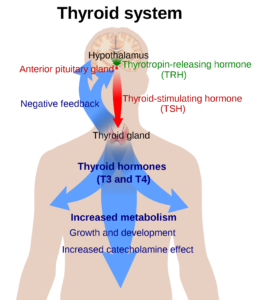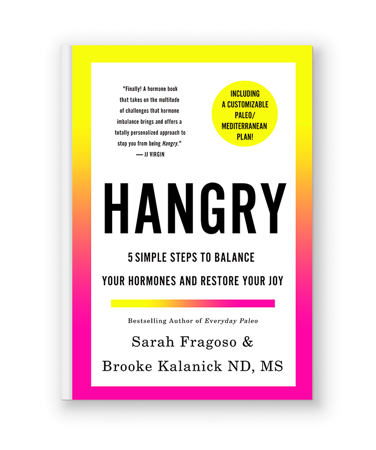
All too often when your thyroid labs come back low you’re given a new prescription for a higher dose of medication. Sometimes this is indeed necessary, but there are many reasons why your T3 (active thyroid hormone) is low – and it may have nothing to do with your dose of medication.
T3 is the active form of thyroid hormone – it’s what your after either from your own production of T3 (converted from T4, which is the main hormone made by your thyroid) OR from taking medications containing synthetic T4 (i.e. Synthroid).
You need adequate T3 for a healthy metabolism in literally every single cell of your body.
Healthy T3 levels in my opinion are between 100-180 for total T3 and 9.2 to 24.1 for Free T3 (which is ultimately what you need because FREE T3 is what has the activity at your cells). Yes sometimes a bump up in medication is necessary, but for many with low T3 the increased dose won’t do much to improve your labs or your symptoms because the reason for the low T3 isn’t being addressed.
Here are 3 ways you can improve your T3 values and feel BETTER – whether you need more medication or not:

1. Treat Inflammation.
Your thyroid gland primarily makes T4, which you then need to convert to T3 (primarily in the liver). If you are taking any T4 medications, those also need to be converted to T3.
Inflammation inhibits this conversion from T4, lowering your total T3 value on labs. Inflammation also can increase the formation of reverse T3, thus draining your overall T3 pool as reverse T3 is inactive – stress does this as well.
Reverse T3 is essentially a brake pedal in the liver, a protective mechanism so that we don’t get too much T3 stimulation after conversion from T4. And that’s not all, inflammation can also affect your hypothalamus and pituitary (brain centers that control all the hormone producing glands, such as the thyroid) which will also lower your total T3 by affecting the signal to the thyroid to make more hormone (known as TSH).
Inflammation is a hormonal deal breaker – if you don’t fix that, no matter what else you do you’ll struggle to get BETTER. And it’s an especially dicey problem if your hypothyroidism is due to Hashimoto’s, as inflammation is both a cause of and result of immune system dysregulation with this autoimmune condition.
Order Hangry right now!
If you’ve ever felt like a Hangry B*tch and are ready to balance your hormones and restore your joy in just 5 simple steps then Hangry is for you!
GET YOUR COPY NOW
Inflammation can be from many sources including food sensitivities (i.e. gluten, dairy, grains, etc.), gut infections (yeast, H.Pylori, etc.), leaky gut, blood sugar problems, lack of sleep, long term stress (high cortisol) and the list goes on. But it’s a problem worth solving as all hormone activity suffers in the presence of inflammation – not just thyroid, although that interaction alone can leave you feeling puffy, tired, in a total brain fog and struggling to lose weight.
2. Stress Less
Elevated cortisol, your main stress hormone, does a number of nasty tricks on the thyroid – all of which give you less active T3.
Yes, you can literally stress yourself hypothyroid – and remember stress isn’t just the running around crazed stress but stress also comes from missing meals, too much or too few carbs, infections, inflammation, exercise, lack of sleep, pregnancy and nursing, as well as many, many other sources.
More how you may be stressing and not even knowing it here. And to read more on how women are uniquely affected by stress, click here.
Like inflammation, cortisol also decreases your total T3 by slowing conversion from T4 as well as ramping up the production of reverse T3. And like inflammation, cortisol over time will also impact your pituitary causing it to release less TSH – the signal to the thyroid to step up thyroid hormone production. When high cortisol or elevated inflammation is the reason for your low T3, you’ll see on your labs TSH below 1.8 typically, which is usually dismissed completely as “not a problem”.

Cortisol’s effect on your T3 levels is far reaching as it also impacts your gut by increasing intestinal permeability or leaky gut which quickly leads to a disruption gut flora (aka good bacteria). And get this, some of your T3 actually comes from these healthy gut bacteria which convert inactive forms of T3 (T3A or T3Acetate and T3A or T3Sulfate) back to active T3. This conversion actually accounts for 20% of your total T3.
You read that right, you can bump your thyroid levels by 20% by cleaning up an unhealthy digestive system. As if that’s not enough, cortisol can also cause your thyroid receptors to become resistant to your thyroid hormone. This means your levels will look great on a lab test but you’ll still be suffering with hypothyroid symptoms.
Oh and chronic cortisol elevation increases inflammation and inflammation raises cortisol.
See the trouble here? Vicious cycle.
3. Balance Estrogen, Testosterone & Blood Sugar
We’ve talked a lot about making T3 from T4, but you also need to have enough FREE T3 vs. just total T3 as it is the free form that has the activity in your body.
It is called “free” because it is not attached to a protein carrier (all hormones are shuttled around your body bound to proteins, just like we get around NYC in a cab). Most thyroid hormone is transported by TBG (thyroid binding globulin) and hormones like estrogen and testosterone affect the levels of this protein, and thus the levels of free T3.
Elevated estrogen due to estrogen dominance or estrogen medications like birth control or hormone replacement (bio-identical or regular) will raise the amount of TBG in your system thus binding up a lot of your thyroid hormone and lowering your free T3.
This is one reason behind weight gain and depression in some women taking estrogen related medications (i.e. the Pill) and estrogen dominance. Testosterone on the other hand, usually elevated from PCOS or from taking replacement therapy, will lower TBG leaving a higher amount of free T3. Which sounds awesome, but it’s not.
Order Hangry right now!
If you’ve ever felt like a Hangry B*tch and are ready to balance your hormones and restore your joy in just 5 simple steps then Hangry is for you!
GET YOUR COPY NOW
Elevated T3 will overstimulate thyroid receptors so they, out of protection, become resistant. Just like with insulin resistance, there is plenty of hormone around (in this case, free T3) but you’re not getting any effect. This resistance can happen with high testosterone or high cortisol. This issue of hormone resistance shows up a lot with women with PCOS as their blood sugar problems can create high cortisol as well as high testosterone. It’s tough for us girls, I know!
To Wrap Up
I want to be clear that I’m not advocating stopping medications or not listening to your doc when they recommend increasing your dose, but keep in mind that is not your only option and none of the above problems will be solved by bumping up your dose.
And what happens when these other issues aren’t addressed is that you typically feel better for a week or so on the new dose but when these processes are all still stealing your T3, you’ll continue to struggle. Don’t forget you have to advocate for yourself and listen to your gut when you feel that your thyroid is still “off”.
And remember that thyroid problems extend far beyond the thyroid. A little house cleaning in these other areas will give you more of that T3 action you’re looking for to help with weight loss, energy, digestion, less dry skin, less hair loss and better memory.
To dig into these ideas plus 2 more causes of Low T3 be sure you’ve got my FREE report And you may also want to grab this one: 5 Things You Need To Know About Hypothyroidism.
